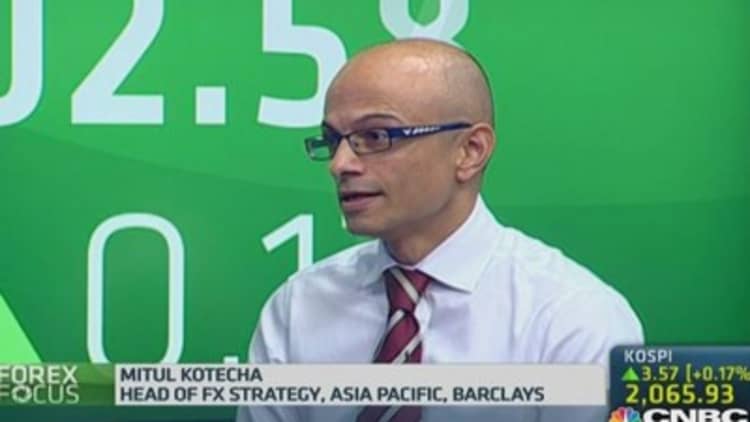Japan's core machinery orders, a leading indicator of capital spending, rose for the first time in three months but came in well below expectations.
Core machinery orders for June rose 8.8 percent on month after a record 19.5 percent plunge in May, government data showed on Thursday, much less than the 15.3 percent gain forecast by Reuters.
On a year-on-year basis, core orders declined 3 percent, versus expectations for a 3.3 percent rise.
More worrying, the Cabinet Office said in a statement that machinery orders are seesawing, which is a downgrade from its assessment last month that orders were in a rising trend but showing some weakness.
Read MoreJapan shows sharp contraction in second quarter
The figures came a day after Japan released gross domestic product data which showed growth slumping an annualized 6.8 percent in the second quarter, as a hike in consumption tax scuppered economic growth.
"As you can see from the machinery orders data, that there was clearly some pass through from the demand hit to corporate spending," Steven Wieting, global chief strategist at Citi Private Bank.
"Unfortunately, the tax increase was also a perfect antidote to the Bank of Japan's easing. It raises national savings, it doesn't harm exports but it holds down domestic consumption and as a consequence, altered the path for the yen weakness which is what they had been looking for with quantitative easing," he added.

Read MoreWhy investors are overlooking Japan's growth collapse
Japan raised its sales tax to 8 percent from 5 percent in April, in bid to reduce its debt-to-GDP ratio which currently stands north of 240 percent. The move has been criticized to be counterintuitive to Prime Minister Shinzo Abe's big push to revive the economy.
The last time Japan raised consumption tax in 1997, the economy fell into recession shortly after.
Still, most analysts think the Japanese economy is in a better position to weather the tax increase this time around.
Read MoreThe future looks tasty for Domino's in Japan
"There is a stronger financial backdrop in japan in there was the 1990s when they last did a large tax increase. The housing sectors are not in anywhere the same kind of shape and in actuality, the monetary policy is very different from the last 20 years," said Wieting.
Calls have been growing for the Bank of Japan to unleash more stimulus measures after its unprecedented monetary easing unveiled last April. But most analysts are sticking to their call of no action until next year.
"At the moment its still early days to say whether we'll see anymore policy easing, in fact we believe it's unlikely to see easing this year. But if the data continues to weaken then that comes back on the table," said Mitul Kotecha, head of FX strategy, Asia Pacific at Barclays.

